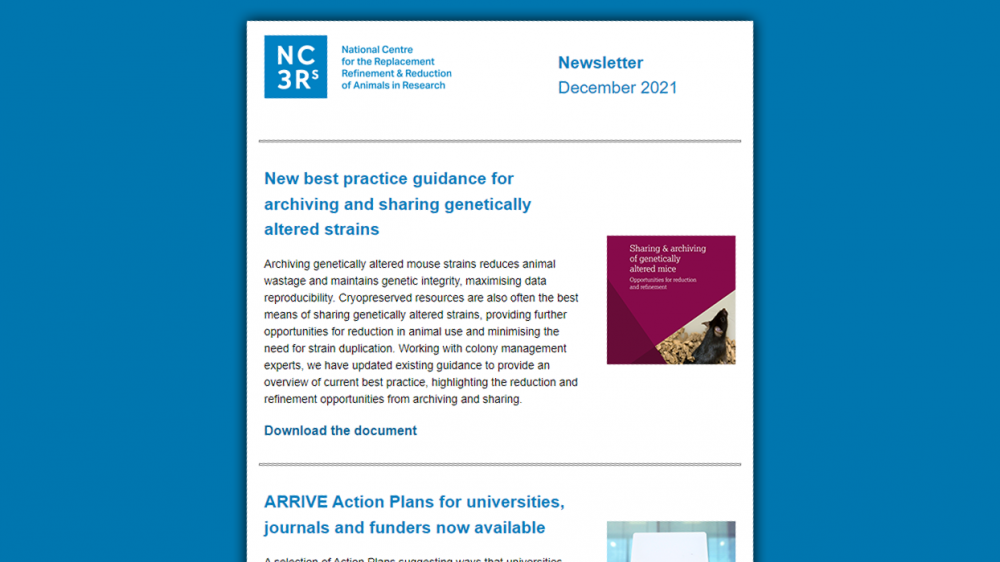Latest news from the NC3Rs: November 2024
In this issue
- Follow us on social media
- Workshop report: Dose level selection for DART studies
- Deadline approaching: In vitro models of complex disease
- Experimental design report now includes ARRIVE Essential 10
- Open call for CRACK IT Challenge ideas
- EPAA 3Rs student grants
- Science media centre: Introduction to the news media
- Patient and public involvement opportunity: Replacing mice in leukaemia research
Follow us on social media
Stay up to date with the latest news from the NC3Rs by following us on social media. You can now find us on Bluesky, alongside our pages on LinkedIn, Facebook and X.
Workshop report: Dose level selection for DART studies
In partnership with the European Centre for Ecotoxicology and Toxicology of Chemicals (ECETOC), Charles River Laboratories and the European Chemicals Agency (ECHA), we recently brought together global stakeholders to discuss dose setting for Developmental and Reproductive Toxicity (DART) studies following advice issued by ECHA in 2022. The advice raised concerns about dosing practices in DART studies which involve testing at doses which can be very high, well beyond the equivalent expected human exposure. The workshop aimed to improve understanding of the ECHA advice to make recommendations on appropriate dose levels in order to avoid unnecessary animal suffering and the need to repeat studies.
Deadline approaching: In vitro models of complex disease
We are collaborating with the MRC, in partnership with Wellcome, BBSRC and EPSRC, to support interdisciplinary research clusters working on advanced human in vitro models for complex disease. If you have an idea to develop, validate or adapt an in vitro model to improve understanding of human disease and reduce the reliance on animal models, be sure to submit your application for the mandatory expression of interest stage.
📅 Expression of interest deadline: Friday 6 December.
Find out more about the MRC/NC3Rs novel human in vitro models of complex disease funding opportunity.
Experimental design report now includes ARRIVE Essential 10
Our Experimental Design Assistant (EDA) tool helps researchers at any level design robust in vivo experiments. We have updated the report generated by the system to include all the methodological information required in the ARRIVE Essential 10 checklist, making it even easier to use the EDA to communicate your experimental plans to funders and ethical review boards or describe methods thoroughly in publications.
Register for our next virtual EDA workshop
Thursday 16 January 2025, 9.00 – 11.00 (GMT)
During this interactive session Dr Esther Pearl (NC3Rs Programme Manager for Experimental Design) will give a live demonstration of the EDA before answering your questions and providing personalised feedback as you design your own experiment.
Open call for CRACK IT Challenge ideas
Do you have an idea to improve R&D in your organisation and refine or reduce reliance on in vivo studies? We are inviting new Challenge ideas for the 2025 CRACK IT competition. If your idea is successful you will collaborate with the NC3Rs to develop the Challenge and define the aims and deliverables, and work with the awardee to support the project’s success through in kind support and end-user input.
❓ Get in touch with questions and to discuss early ideas: crackit@nc3rs.org.uk.
📅 Deadline for submissions: Monday 10 February 2025.
EPAA 3Rs student grants
The European Partnership for Alternative Approaches to Animal Testing (EPAA) is offering grants to support students and young scientists participate in high-profile international meetings dedicated to the 3Rs. Students accepted for an oral presentation at MPS world summit, SETAC or EUROTOX in 2025 can apply for a grant of €1,000 to cover event registration, travel and accommodation. Students based in the UK and the EU are eligible to apply.
Find out more and apply for an EPAA student grant.
Science media centre: Introduction to the news media
Wednesday 5 February 2025, 13.30 – 17.30
King’s College London
The Science Media Centre are running a seminar for scientists working on issues likely to be in the news (such as research that involves or replaces animals) but who feel they lack the skills and confidence to engage with journalists. The event features talks from press officers, journalists and scientists, alongside panel sessions and networking opportunities. Places are limited and scientists at postdoctoral level and above will be prioritised, with senior scientists particularly welcome. For further information and queries contact: introduction@sciencemediacentre.org
Patient and public involvement opportunity: Replacing mice in leukaemia research
Have you been affected by leukaemia as a patient, parent or carer? Dr Deepali Pal is looking for members of the leukaemia patient community to review her future research proposals, building on her NC3Rs-funded work to develop patient-derived leukaemia cell-based models that replace the use of mice.
Find out more: Finding safer and kinder ways to treat children's leukaemia.
Create a website account to subscribe and receive the latest articles, events and funding opportunities from the NC3Rs in your email inbox every month.

